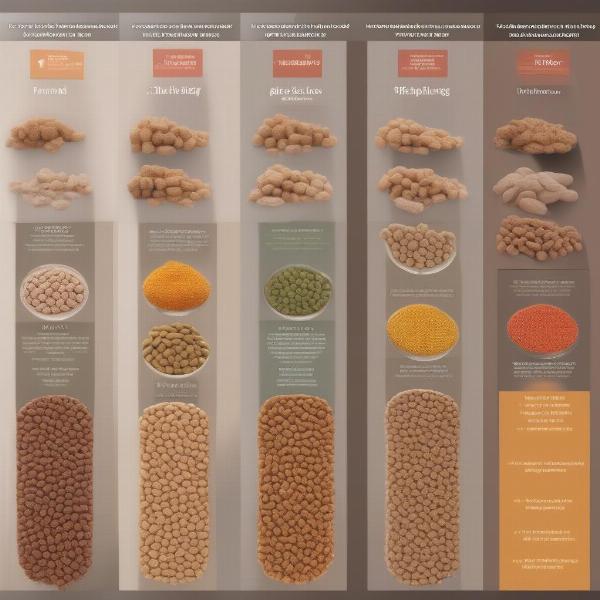Southend dog training food plays a crucial role in your dog’s overall health and well-being, impacting not only their physical development but also their ability to learn and thrive during training. Choosing the right food for your dog in Southend-on-Sea, considering their breed, age, activity level, and specific training needs, is essential for successful training and a happy, healthy pet.
Fueling Focus: The Best Dog Food for Training in Southend
Choosing the right dog training food in Southend can be overwhelming with so many options available. Look for high-quality kibble or wet food that’s rich in protein to support muscle development and provide sustained energy for training sessions. Avoid foods with fillers, artificial colors, and excessive by-products. Consider your dog’s specific dietary needs and consult with your vet for personalized recommendations. A balanced diet contributes significantly to a dog’s ability to focus and learn during training.
Tailored Nutrition: Choosing the Right Food for Your Dog’s Breed
Different breeds have different nutritional needs. A working dog like a Border Collie will require a higher calorie, protein-rich diet compared to a smaller, less active breed like a Chihuahua. Research your dog’s breed-specific needs or consult a vet in Southend to ensure they’re receiving the optimal nutrition for their size and activity level, particularly during training. dog friendly accommodation southend on sea can be a great resource for dog owners visiting the area.
Age Matters: Adjusting Your Dog’s Diet Throughout Their Life
Just like humans, dogs have different nutritional requirements at various life stages. Puppies need food formulated for growth, while senior dogs benefit from lower-calorie options with added joint support. Adjusting your dog’s food according to their age ensures they receive the right nutrients for their current needs, supporting their overall health and facilitating effective training.
 Dog Food for Different Life Stages
Dog Food for Different Life Stages
Treating Right: Using Food Effectively During Training Sessions
Treats are a valuable tool in positive reinforcement training. Choose small, palatable treats that are easy to chew and swallow so they don’t disrupt the flow of the training session. Look for healthy, low-calorie training treats or consider using small pieces of your dog’s regular food as a reward. southend dog food offers a wide variety of options to choose from.
What type of treats should I use for dog training?
Small, healthy, and palatable treats are ideal for dog training.
Beyond Kibble: Exploring Alternative Feeding Options for Dogs
While kibble is a popular choice, other feeding options exist, including wet food, raw diets, and homemade meals. Research these options thoroughly and consult with your veterinarian before switching your dog’s diet. Ensuring a balanced and appropriate diet is critical for your dog’s overall health and well-being, impacting their trainability and responsiveness.
Conclusion: Optimizing Your Dog’s Diet for Successful Training in Southend
Choosing the right southend dog training food is a vital part of responsible dog ownership. By focusing on high-quality ingredients, considering your dog’s individual needs, and utilizing treats effectively during training, you can contribute significantly to their overall health, happiness, and training success. Finding dog friendly hotels southend can make your visit with your furry friend much more enjoyable.
FAQ:
- What should I look for in a good dog training treat? Look for small, palatable, and healthy treats that are easy to chew and swallow.
- How often should I change my dog’s food based on their age? Consult your veterinarian for specific recommendations, but generally, puppies, adult dogs, and senior dogs require different formulations.
- Can I feed my dog a raw diet during training? Discuss raw diets with your veterinarian to ensure it’s appropriate for your dog’s specific needs and training regimen.
- What are the benefits of high-quality dog food? High-quality dog food provides optimal nutrition for growth, energy levels, coat health, and overall well-being, which are all essential for effective training.
- Are there specific food allergies I should be aware of? Common dog food allergies include chicken, beef, dairy, and wheat. Consult your veterinarian if you suspect your dog has a food allergy.
- How can I transition my dog to a new food? Gradually mix the new food with the old food over several days to prevent digestive upset.
- Is it okay to give my dog human food as treats during training? Some human foods are safe for dogs in moderation, but avoid processed foods, chocolate, grapes, and onions, which can be toxic.
ILM Dog is your go-to resource for expert advice on dog care, including breed selection, health, training, nutrition, grooming, and much more. We provide practical, trustworthy information for dog owners of all experience levels, helping you navigate every aspect of caring for your canine companion. dog skin coat is another important topic for dog owners to consider. For personalized guidance and expert tips, contact us at [email protected] or call us at +44 20-3965-8624. ILM Dog is dedicated to helping you provide the best possible care for your furry friend.